
views
Including your Friend in Activities with Others
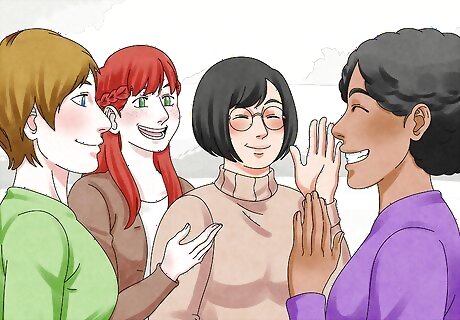
Invite your friend to join the group. This might feel hard if your friend has made occasions with your other friends uncomfortable in the past. However, stay positive. If your friend knows they’re wanted in a situation, they may be less likely to act out of jealousy. Don’t remind your friend of times they may have made social situations uncomfortable in the past. This may make them feel more insecure about re-entering a situation like that. Emphasize that it’s their choice. They don’t need to feel obligated to hang out if the idea makes them uncomfortable. If your friend has been cruel or manipulative to your other friends in the past, inviting them to join the group may do more harm than good.
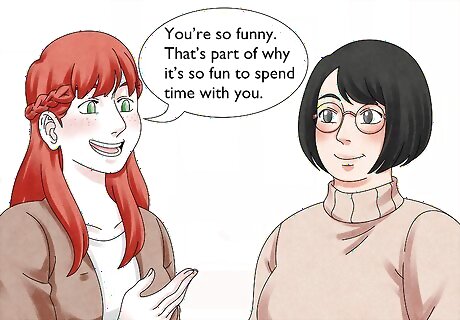
Help boost your friend’s confidence. Jealousy is usually a sign that someone feels insecure. Helping your friend build self-esteem may help some of their jealous feelings subside. Tell your friend things you appreciate about them. It’s great if you can emphasize reasons you value spending time with them. You can say something like, “You’re so funny. That’s part of why it’s so fun to spend time with you.” Or, you can offer something like, “You always have such good ideas of where to go to eat.”
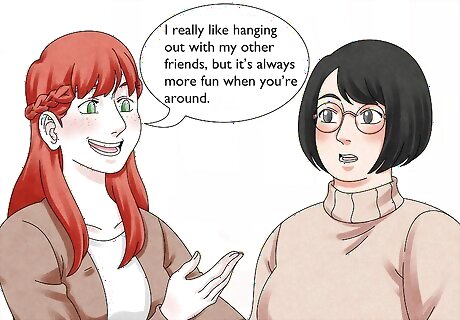
Let them know there’s no need to feel threatened. A friend who is jealous of your other friends may think that your other friends are more valuable to you. Let your friend know that you’re not planning to replace them with other friends. Even if your friend hasn’t said it, they may be afraid you’re going to forget them or abandon the friendship. Make it clear that this isn’t true. You can say something like, “I really like hanging out with my other friends, but it’s always more fun when you’re around.” You can also say, “I really hope you’ll want to hang out with all of us. I miss you when you’re not around.”

Choose an activity that will be comfortable for them. If you truly want to include your friend, make sure you invite them to do something that they would enjoy. Otherwise, you could end up fueling their feelings of insecurity and jealousy. Choose a place that’s easy for your friend to get to, and where they feel comfortable. For example, don’t choose somewhere that is close to you and your other friends but a long bus ride from where your friend lives. Pick something that you already know they enjoy. For example, don’t invite them over to play a game that your other friends know but your one friend doesn’t. If you’re going to go out to eat, you can ask your one friend to pick the restaurant. You want your friend to feel comfortable, but you don't want them to have all of the control. Make sure you're not being manipulated into simply doing whatever this one friend wants to do.
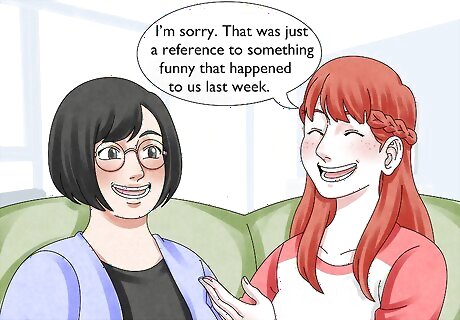
Be yourself when combining friend groups. If you haven’t spent much time with your one friend and the rest of your friends together, you might feel a little uncomfortable at first. Stay true to yourself. Don’t worry about how your friends may expect you to behave. If you have inside jokes with a certain friend, you can acknowledge them without excluding the others. You can simply say, “I’m sorry. That was just a reference to something funny that happened to us last week.” Or, if it makes sense, you could take the time to explain the joke. If a friend accuses you of not acting genuinely, you can explain yourself. For example, if a friend says, “I thought you didn’t like those kinds of movies,” you can explain that, “I actually have started watching movies like that recently and I do like them. I guess I just haven’t talked to you about it.”

Remind your friend that you value them and your other friends. The great thing about friendship is that you can have multiple friends. Let your friend know that it’s important to you to have friendships that don’t threaten each other. Always make sure your friend knows what you value about them. If they are a reliable, helpful friend, tell them and thank them for that. You can also gently let them know what you like about your other friends. You can say, “I really enjoy the intellectual conversations I have with that person. I don’t need to do that all the time, but I like getting to engage that way occasionally.”
Telling your Friend how you Feel About their Jealousy
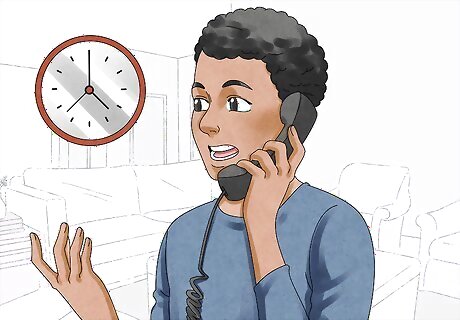
Choose a time to talk to them. Make sure they know that you’d like to have an important conversation. You don’t want them to feel caught off guard. Ask them when would be a good time. Make sure you’ll have enough time to have the conversation without it feeling rushed. Choose a place where you can speak privately and comfortably.
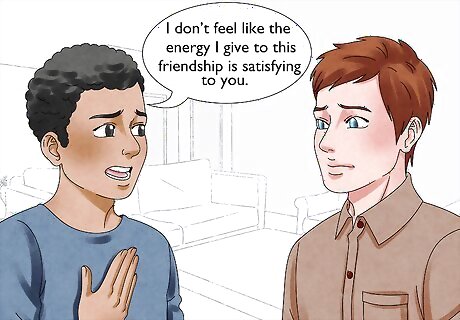
Let your friend know that their jealousy is hurtful for you. Be honest without being accusatory. You don’t have to place judgements on their behavior; you can simply talk about how you feel. Use "I" Statements. Instead of saying, “You make situations with my other friends unpleasant,” you can say, “I feel awkward when we’re with my other friends and you comment on their clothes.” Instead of saying, “You’re too needy,” you can say, “I don’t feel like the energy I give to this friendship is satisfying to you.” Mention specific examples, if you can. You can say something like, “When you suggested that I skip my friend’s birthday party, I felt that you didn’t want me to socialize with people who are important to me.”
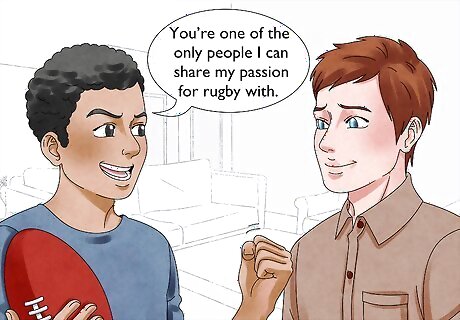
Let them know you appreciate their strengths. Your friend may be feeling particularly vulnerable at this point. Make sure they know that you value their friendship because of their wonderful qualities. Remind your friend of things you share in common, especially if it’s something unique. You could say something like, “You’re one of the only people I can share my passion for rugby with.” Show them that you appreciate their positive qualities. Say something like, “I’ve always valued how great you are at problem solving. I really appreciate that about you.”
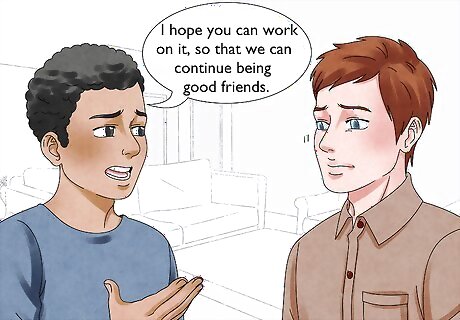
Tell them that you need them to trust your friendship. It’s great that you’re making these efforts to restore your friendship. However, your friend needs to do some of that work too. Let them know that they need to have faith in your friendship in order to meet you halfway. If your friend can’t work on their own jealousy, the friendship may not last much longer. You can gently say something like, “I have a hard time dealing with this jealousy. I hope you can work on it, so that we can continue being good friends.” Be assertive. Let them know that trust is important in a friendship, and that it’s a two-way street.
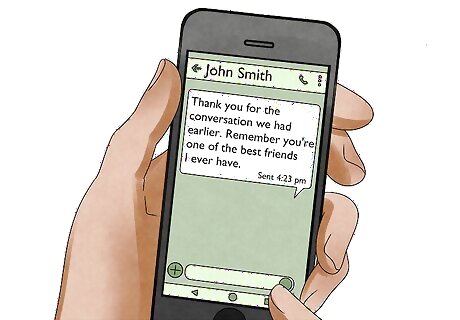
Continue to show them that you’re still invested in the friendship. At the end of the conversation, make plans to spend time together again soon. This will let your friend know that you don’t plan to end the friendship. Ask your friend how they’d like to spend time with you. This shows that you want them to be getting something out of the relationship. Send a text or e-mail later that day thanking them for the conversation. Reiterate that you are grateful for their friendship.
Limiting or Ending the Friendship
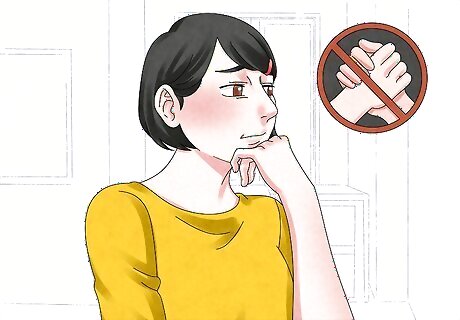
Consider if you definitely want to end the friendship. Ending a friendship can be as difficult as ending a romantic relationship. Don’t take the decision lightly. Before you decide to end a friendship, consider if there are any alternatives.You may just need to limit the time you spend with this person. Even if a friendship is difficult, it may be worth preserving if you have many mutual friends, or if you work together. Otherwise, ending the friendship could cause ongoing tension that you can’t get away from. You can try taking some space away from this friend to see how your social life feels without that relationship. You can tell your friend you plan to take some time away from them, or simply do so without mentioning it.

Practice what you will say to your friend. Breaking up is a delicate business. Prepare yourself by knowing exactly what you plan to say. You can even write out a script for yourself to practice from. If you do write out a script, don’t bring it with you to the conversation. If an in-person conversation feels too scary, you can write a thoughtful letter or e-mail to your friend explaining your position. You can decide whether to ask for some space temporarily, or to let them know that the friendship is over.
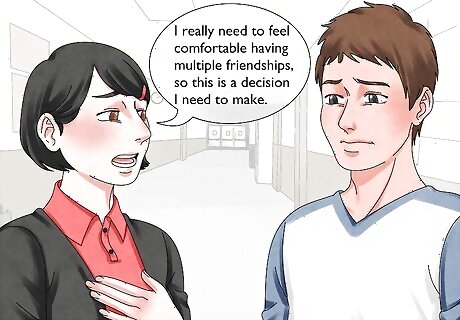
Emphasize your responsibility for the decision. Your friend will likely feel saddened and rejected by this turn of events. Don’t make it worse by blaming them for your decision. Emphasize that this is something that you need to do for your own well-being. Use “I” statements to avoid blame. You can say, “I really need to feel comfortable having multiple friendships, so this is a decision I need to make.” You can also express your feelings about the decision. You can say, “I feel sad that we can’t be as close as we used to be, but I don’t think spending so much time together is healthy for me.”
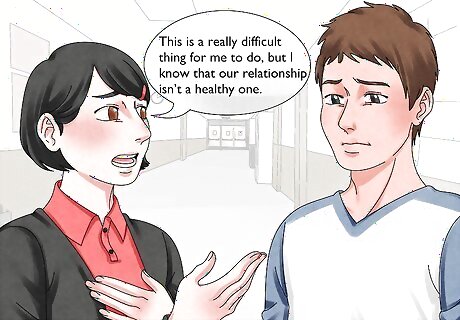
Be honest, but gentle. Remember that this is someone you’ve been close to. You don’t want to hurt their feelings needlessly. Besides, if they’ve been acting jealous, chances are that they’re already feeling insecure. You can say something like, “This is a really difficult thing for me to do, but I know that our relationship isn’t a healthy one.” If you’re asked for an explanation or examples, offer them. It may be helpful for your friend to hear concrete reasons that the friendship needs to change.




















Comments
0 comment